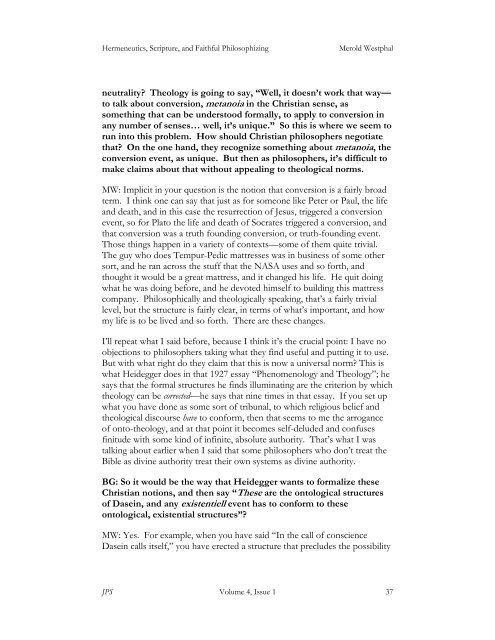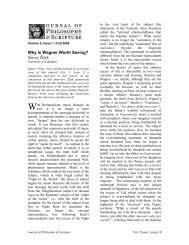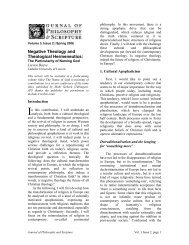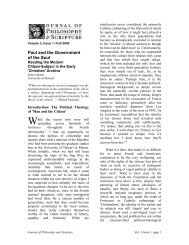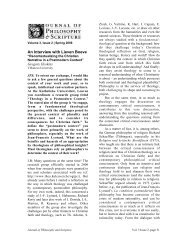interview with Merold Westphal - Journal of Philosophy and Scripture
interview with Merold Westphal - Journal of Philosophy and Scripture
interview with Merold Westphal - Journal of Philosophy and Scripture
You also want an ePaper? Increase the reach of your titles
YUMPU automatically turns print PDFs into web optimized ePapers that Google loves.
Hermeneutics, <strong>Scripture</strong>, <strong>and</strong> Faithful Philosophizing <strong>Merold</strong> <strong>Westphal</strong><br />
neutrality? Theology is going to say, “Well, it doesn’t work that way—<br />
to talk about conversion, metanoia in the Christian sense, as<br />
something that can be understood formally, to apply to conversion in<br />
any number <strong>of</strong> senses… well, it’s unique.” So this is where we seem to<br />
run into this problem. How should Christian philosophers negotiate<br />
that? On the one h<strong>and</strong>, they recognize something about metanoia, the<br />
conversion event, as unique. But then as philosophers, it’s difficult to<br />
make claims about that <strong>with</strong>out appealing to theological norms.<br />
MW: Implicit in your question is the notion that conversion is a fairly broad<br />
term. I think one can say that just as for someone like Peter or Paul, the life<br />
<strong>and</strong> death, <strong>and</strong> in this case the resurrection <strong>of</strong> Jesus, triggered a conversion<br />
event, so for Plato the life <strong>and</strong> death <strong>of</strong> Socrates triggered a conversion, <strong>and</strong><br />
that conversion was a truth founding conversion, or truth-founding event.<br />
Those things happen in a variety <strong>of</strong> contexts—some <strong>of</strong> them quite trivial.<br />
The guy who does Tempur-Pedic mattresses was in business <strong>of</strong> some other<br />
sort, <strong>and</strong> he ran across the stuff that the NASA uses <strong>and</strong> so forth, <strong>and</strong><br />
thought it would be a great mattress, <strong>and</strong> it changed his life. He quit doing<br />
what he was doing before, <strong>and</strong> he devoted himself to building this mattress<br />
company. Philosophically <strong>and</strong> theologically speaking, that’s a fairly trivial<br />
level, but the structure is fairly clear, in terms <strong>of</strong> what’s important, <strong>and</strong> how<br />
my life is to be lived <strong>and</strong> so forth. There are these changes.<br />
I’ll repeat what I said before, because I think it’s the crucial point: I have no<br />
objections to philosophers taking what they find useful <strong>and</strong> putting it to use.<br />
But <strong>with</strong> what right do they claim that this is now a universal norm? This is<br />
what Heidegger does in that 1927 essay “Phenomenology <strong>and</strong> Theology”; he<br />
says that the formal structures he finds illuminating are the criterion by which<br />
theology can be corrected—he says that nine times in that essay. If you set up<br />
what you have done as some sort <strong>of</strong> tribunal, to which religious belief <strong>and</strong><br />
theological discourse have to conform, then that seems to me the arrogance<br />
<strong>of</strong> onto-theology, <strong>and</strong> at that point it becomes self-deluded <strong>and</strong> confuses<br />
finitude <strong>with</strong> some kind <strong>of</strong> infinite, absolute authority. That’s what I was<br />
talking about earlier when I said that some philosophers who don’t treat the<br />
Bible as divine authority treat their own systems as divine authority.<br />
BG: So it would be the way that Heidegger wants to formalize these<br />
Christian notions, <strong>and</strong> then say “These are the ontological structures<br />
<strong>of</strong> Dasein, <strong>and</strong> any existentiell event has to conform to these<br />
ontological, existential structures”?<br />
MW: Yes. For example, when you have said “In the call <strong>of</strong> conscience<br />
Dasein calls itself,” you have erected a structure that precludes the possibility<br />
JPS Volume 4, Issue 1 37


